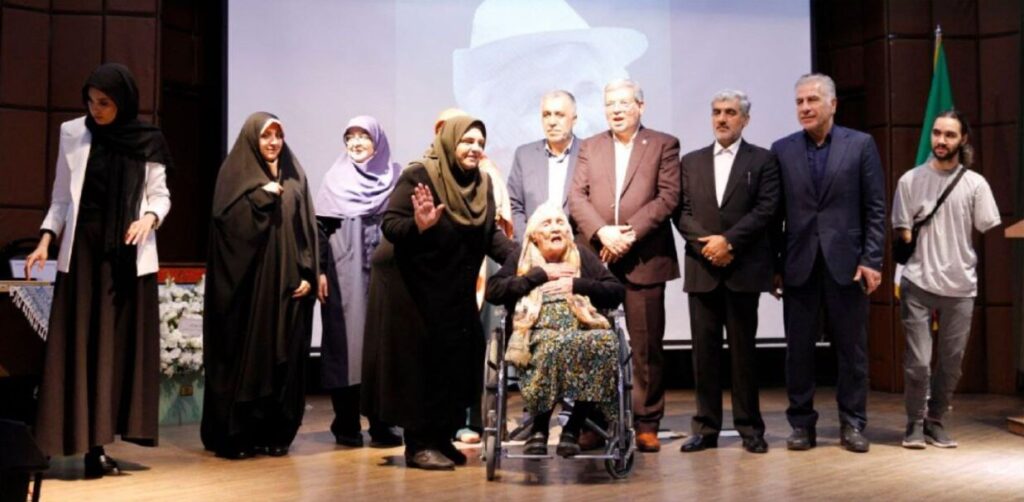The Tehran-A ceremony to honor Samine Baghcheban, a well-known Iranian educator, was held on Thursday evening at Tehran’s humanities thinkers.
At the beginning of the ceremony, Ali Rabiei, the president’s aide for social issues, called the woman who played a lasting role in modern Iranian folk literature and cultural movements, Baghcheban, Irna reported.
“She is a prominent figure in the field of education, especially for difficult children and deaf people. She has made a major contribution to the development of education,” he added.
“She has proven that children’s literature is not merely a tool for entertainment, but for the cultural and social development of future generations. Perhaps there is no word to describe her better than “commitment.” She is a role model for women who want to play an active role in social and cultural fields. Even the mother of society, and even the mother of Iran, expanded it nationwide.
“Samineh Baghcheban wasn’t just a teacher. She was a cultural pioneer. Her leadership, mentoring, writing, translation and involvement in establishing a system for the deaf all testify to her brilliance, perseverance and commitment,” he said.
Following on, government spokesman Fatemeh Mohajerani said, “I am honored to be among you. She then took this opportunity to read a message from President Masuud Pezeskian.
In his message, Pezeshkian praised Baghcheban’s lasting contribution to Iranian culture, children’s literature, and the education of the deaf.
The president highlighted her important efforts to protect and promote Iran’s precious intangible cultural heritage through her editing of stories, folklore and Iranian songs.
Furthermore, President Pezeshkian pointed out that Bugcheban’s prominent name, along with his famous father, Jabbagbang, is a pioneer in child education and founder of the first school for the deaf, continues to inspire and empower future generations.
Also at the event, Salar Ghasemi said she is the head of a special needs education institution. “Samineh Baghcheban worked with his father to educate the children of this land. We are pleased to announce that we will soon establish the Museum of Culture and Education in Baghcheban.”
“We currently have 10,000 hearing impaired students, but we have not yet found a better alphabet than the one created by Bugcheban,” he added.
Mirza Jabbar Asgarzadeh, famous as Jabbar Baghcheban, founded the first Iranian kindergarten and the first school for the deaf in Tabriz. He was also the inventor of Persian cues.
The first kindergarten he founded was called “Bagshe Atfal”. This means “children’s garden.” That’s why he was given the nickname Baguchuban, which literally means “gardener” in Persian.
He founded a school for the Deaf in 1924, next to the kindergarten. In 1928 he wrote the first Iranian children’s book entitled “Bababarfi” in Persian.
Mohsen Roh Musavi, president of the National Sign Language Association, took the stage and expressed his word through sign language. path. “
The ceremony concluded with Tamine Baguchban’s 100th birthday celebration, along with her presence on stage.
In a short speech, she said: “I loved life and served the deaf. If I had another opportunity, I would choose the same path.”
Samineh Baghchehban was born in 1925 in Tabriz, northwest of Iran. She received her bachelor’s degree from Teachers College in Tehran and was awarded the Fulbright Scholarship to continue her research in the United States. She received her master’s degree from Smith College in 1953, and a scholarship for Middle Eastern students was founded in the name of the deaf from Clarks School in Northampton, Massachusetts.
She has devoted over 60 years of life to education, training teachers, developing Baghcheban’s methods of teaching Persian to both Iranians and non-Iranians, writing primary school textbooks used throughout Iran, and writing books for children for both hearing and hearing children.
Her father, the late Jabbar Baghcheban, founded Iran’s first modern kindergarten. He was also the founder of Iran’s hearing impaired education and developed the world’s unique voice hand alphabet.
Initially, his father and leader, Samine lived on the legacy of his father, who died by continuing his work. Her publications include numerous textbooks, professional papers and articles in Iranian magazines. She also translated several books from English to Persian.
SS/SAB

